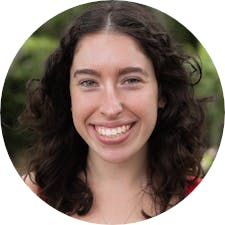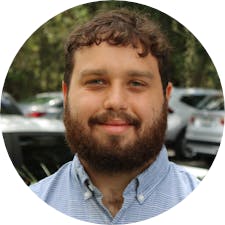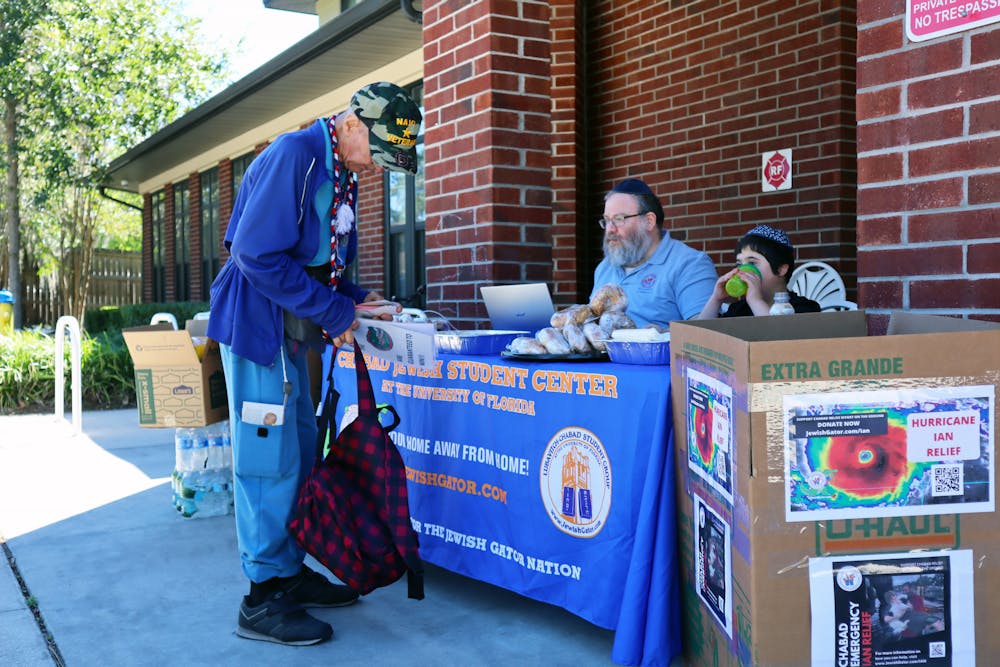Carolina Boitel’s hometown was underwater — local restaurants were flooded, cars were submerged and trees were uprooted.
The 19-year-old UF computer science sophomore is from Fort Myers, one of the Southwest Florida cities primarily destroyed by Hurricane Ian. She lost contact with her family in the evening Sept. 27, so she resorted to scanning news stations and social media from her apartment in Gainesville.
“It’s just devastating seeing your hometown completely under ruins, submerged underwater, and you’re 300 miles away, and there’s nothing you can do about it,” Boitel said.
While Gainesville students and residents alike felt only indirect effects from the storm, many have families further south who witnessed the full extent of the disaster. The state has seen more than 70 deaths in Ian’s wake, according to a Saturday Miami Herald report.
The death toll has been highest in Charlotte, Lee, Sarasota and Volusia counties.
The UF community has mobilized to provide material and financial support to the affected areas, some organizing food and item drives, and others sending rescue groups to Southwest Florida.
Boitel’s family was safe and only saw power outages, uprooted trees and debris fall on their yard. Others saw more severe effects like extensive flooding from rain and storm surge.
“It's just really frustrating and heartbreaking, especially just not being able to be there,” Boitel said. “During a time like this is when I’d most want to be with my family.”
Although Allison Skolmutch, a 20-year-old UF business management junior, knew the hurricane was headed toward the state. She carried on Sept. 26 and 27 as usual, attending the career fair and going to classes.
She hadn’t expected the storm to grow to a Category 4 — it wasn’t until Sept. 27, she said, that she realized its strength.
Even more, she didn’t expect it to head toward her family in Fort Myers.
“I've never seen anything like this happen to my town before,” Skolmutch said. “That's my hometown. I know this area. I grew up in this area. And now it's all under water.”
Skolmutch has fond childhood memories of family trips to Fort Myers Beach and Sanibel Island, which she described as a beautiful beach town. Her family has lived in the same house in inland Fort Myers her whole life. Luckily, she said, their home didn’t flood; they only saw power outages that made contacting each other more difficult.
“It just doesn't seem real to me,” Skolmutch said. “I still in my mind feel like I'm going to go back home for Thanksgiving and all those beaches are still going to be as they are. But in reality, I know it's going to probably take a while for them to recover.”
University centers and farms through the UF Institute of Food and Agricultural Sciences across the state also sustained damages.
The Range Cattle Research and Education Center, located about an hour inland from Sarasota, saw heavy flooding, with students, faculty and animals still trapped in the area, said Jeanna Mastrodicasa, IFAS associate vice president for operations. Thankfully, she said no person or animal was injured by the storm.
It wasn’t until Sept. 30 — three days after Ian first made landfall — that IFAS was able to contact the center. After some storm water receded Sept. 30, a rescue group brought the center a satellite-powered phone to facilitate communication back to Gainesville.
After decades of dealing with hurricane aftermath, IFAS has learned texting is the most efficient and reliable way to contact affected areas, Mastrodicasa said.
“It was scary,” Mastrodicasa said. “We just had to wait and see. There was so much rain and such a slow moving storm. A lot of places you just couldn't reach.”
IFAS deployed groups from Gainesville and other central Florida locations to the Range Cattle Center to aid in recovery and clean-up, she said. Although she couldn’t estimate the cost of damages yet, Mastrodicasa said recovery may be slow due to lack of supplies and time for insurance reimbursements to apply.
“We did our best to be ready,” Mastrodicasa said. “We were ready. And now we're ready to respond.”
As UF students became increasingly concerned regarding the hurricane’s impact on their classes, the university activated its Crisis Phone Bank — a line where students with families near-direct impact of the storm could ask questions about the university’s handling of the hurricane. UF also created an extra line to deal with a high expected volume of callers.
UF spokesperson Cynthia Roldan said the additional line was integral to fielding questions as the university received a massive wave of calls. It caused students and families to wait for significantly long periods of time for any response.“It's an assistance for us to be able to help the community reach the information faster,” Roldan said.
Other campus organizations have organized relief efforts in the form of food and material drives.
Jewish Gators, the UF branch of Lubavitch Chabad, collected generators, non-perishable food items, toys and other donations for affected families in Central and Southwest Florida. Student volunteers on the Jewish Gator student board drove the materials to affected areas Sept. 30, Rabbi Berl Goldman said.
Chabad also opened its doors for those who needed shelter and meals during the hurricane. Goldman said he sees the recovery effort as collaboration between people of all faiths in aiding those affected by the hurricane.
“I am continually impressed and empowered and inspired by the random acts of generosity, caring in every way by every type of person,” Goldman said. “The human spirit and soul and kindness is amazing.”
Gainesville Fire Rescue deployed its regional task force, which is trained to make it through flooding, debris and destroyed areas, to Southwest Florida too. The team’s goal is to search, rescue and provide care for individuals trapped by destruction.
Assistant Chief David Sutton said Gaineville’s group, named Task Force 8, has conducted search and rescues for similar disasters in the past, including the collapse of a condo building in Surfside June 2021.
“We're proud that we have those individuals that have acquired that training in our department so that we can be part of the rescue efforts,” Sutton said.
For those unable to evacuate, such efforts help damaged communities rebuild following the wake of the hurricane.
Cole Erickson, a 19-year-old UF international studies sophomore, said his family in Alva, Florida, experienced similar issues. Their property had fallen trees, water damage, damage to their pool enclosure and power outages.
However, evacuation was difficult, both because of the family’s German Shepherd dog and how late-noticed the hurricane’s change in direction was.
“A large part of it also has to do with how unpredicted it was,” Erickson said. “People didn’t really have that much time to prepare.”
Sutton advised students to prepare themselves for future storms by following evacuation orders and stocking up on supplies if they’re expecting a direct hit. He also said it’s important not to visit damaged sites until it’s completely safe to do so.
“The first step is do everything you can to not be in the position where you need to be rescued from your home,” Sutton said.
To support those affected by the hurricane, the Federal Emergency Management Agency, Red Cross and Volunteer Florida are accepting donations and volunteers at this time.
Contact Alissa at agary@alligator.org and Aidan at abush@alligator.org. Follow them on Twitter @AlissaGary1 and @aidandisto.

Alissa is the Fall 2025 editor-in-chief of The Alligator. She has previously been engagement managing editor and university editor, and she has covered stories across UF and Gainesville. She was also an intern at the Orlando Sentinel and The Chronicle of Higher Education. In her free time, she likes to spend time with her cat and take care of her plants.

Aidan Bush is a fourth-year journalism major and the Summer 2024 Editor-in-Chief of The Alligator. In his free time, he likes to listen to music and go kayaking.






